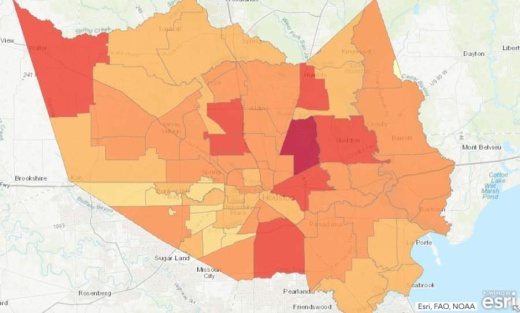These values, along with local tax rates, are the two main factors that go into how much each resident owes in property taxes next January.
Although a disaster declaration has been declared for the state of Texas, that declaration is not going to trigger property tax relief, Attorney General Ken Paxton said in a recent ruling.
After Hurricane Harvey, the Texas Legislature passed a law that would allow property damaged in a natural disaster to have exemptions applied to home values that could range from 15%-100%, ensuring homeowners dealing with damage would have lighter tax bills come January. In his ruling, Paxton said the law only applies to physical damage, not economic loss.
"A court would likely conclude that the Legislature intended to limit the temporary tax exemption to apply to property physically harmed as a result of a declared disaster," Paxton wrote. "Thus, purely economic, nonphysical damage to property caused by the COVID-19 disaster is not eligible for the temporary tax exemption provided by [that section] of the Tax Code."
State Sen. Paul Bettencourt, R-Houston, who authored the 2019 bill Paxton referenced, said he sought an expedited opinion from Paxton out of concern that the coronavirus pandemic and the drop in oil prices could put many taxpayers in a bind. However, he said he was not surprised by the ruling. Across Texas, more 1.3 million Texans have filed for unemployment since mid-March, according to state data.
"Sadly, instead of having a fun Texas two-step, we're facing a Texas double whammy of the COVID-19 shutdown shock as well as oil demand shock," Bettencourt said in an April 22 phone interview. "That’s the real issue with what we’re facing now. It’s not physical damage. It’s purely economy activity damage."
When home values are appraised each year, appraisal districts like HCAD are instructed by state law to base appraisals on the value of a home as of Jan. 1, HCAD spokesperson Jack Barnett said. As a result, 2020 home values were assigned based on data gathered prior to the economic downturn. Any change in value caused by the pandemic will be reflected in 2021 values, Barnett said.
Across Harris County, about 74% of the homes saw an increase in value, 10.1% saw a decrease and 15.8% had no change, according to HCAD data.
"Values were accurate, and there is no provision in the tax code that allows us to change them for an event like this COVID-19 pandemic," Barnett said in an email. "If a property owner did not think the value was accurate, they can always file a protest."
Bettencourt also urged homeowners to file protests. With homes increasing by 5%-6% on average, Bettencourt said a successful protest could actual lead to a decrease in value.
"There was also a question about whether they would freeze values," Bettencourt said. "You can’t do that according to the Constitution, but in a situation like this, it’s actually better to protest them."
Barnett said protests can be done entirely electronically through HCAD's iFile and iSettle tools, which allow homeowners to upload evidence for why a value should be changed for an appraiser to review. For cases that go to arbitration, Barnett said HCAD is exploring options for how to conduct hearings electronically. Bettencourt said most arbitration in Harris County is already done by phone.
"I think there’s going to be just a bunch of this done electronically—either online, telephone or virtually," he said.
The deadline to protest has not changed Barnett said. All protests must be filed by May 15 or within 30 days of the date on the notice.
Another major factor that goes into each homeowner's property tax bill is tax rates, which are typically set by taxing jurisdictions, such as cities, counties and special districts, in the fall.
Senate Bill 2, which passed the Texas Legislature in 2019, set new "voter approval rates" for taxing entities that set a limit for how much an entity can increase property tax revenues—3.5%—before needing voter approval. Another bill set a 2.5% cap specifically for school districts, requiring the state to fill in the gaps from its own coffers.
A provision in Senate Bill 2 allows a taxing entity to raise its "voter approval rate" to 8% instead of 3.5% if it is located within an area affected by a disaster declaration. However, in comments made in March, Abbott said the only taxing entities to which that exception would apply are hospital districts.
Bettencourt said he thinks there will be pressure on taxing entities to look to provide relief either way.
"The bottom line is that after all the protests are filed and everything else is done, if the levy increases for jurisdictions, there will be tax rate reductions," he said. "I think there’s going to be enormous pressure on taxing jurisdictions when they set tax rates in the fall, regardless of what the voter-approved rates are."
Bettencourt said state legislators are already looking into ways—possibly through an executive order from Abbott—to provide more flexibility on deadlines to pay taxes, penalties and interests.
"All of that is under discussion," he said.





